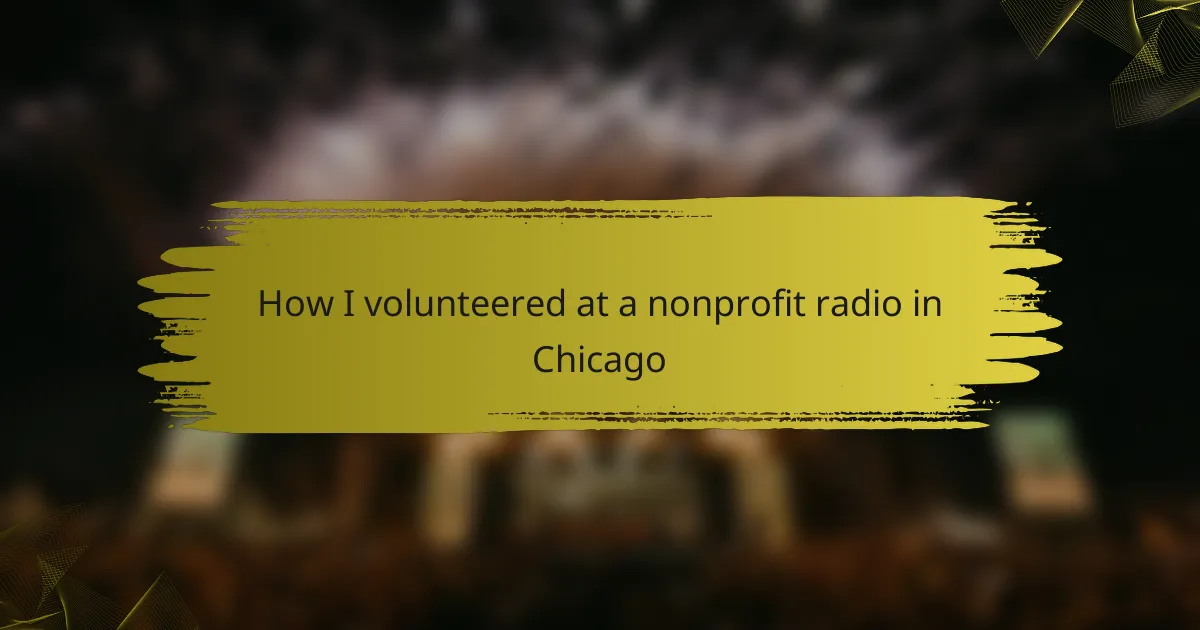Key takeaways
- Independent and nonprofit radio provide essential platforms for underrepresented voices, fostering community engagement and genuine storytelling.
- Volunteering at nonprofit radio stations allows individuals to develop valuable skills in media production, communication, and teamwork while promoting local culture.
- Nonprofit radio prioritizes community interest over profit, offering diverse programming that reflects local issues and perspectives.
- Community media helps build social cohesion by bringing people together and amplifying local talents and stories.
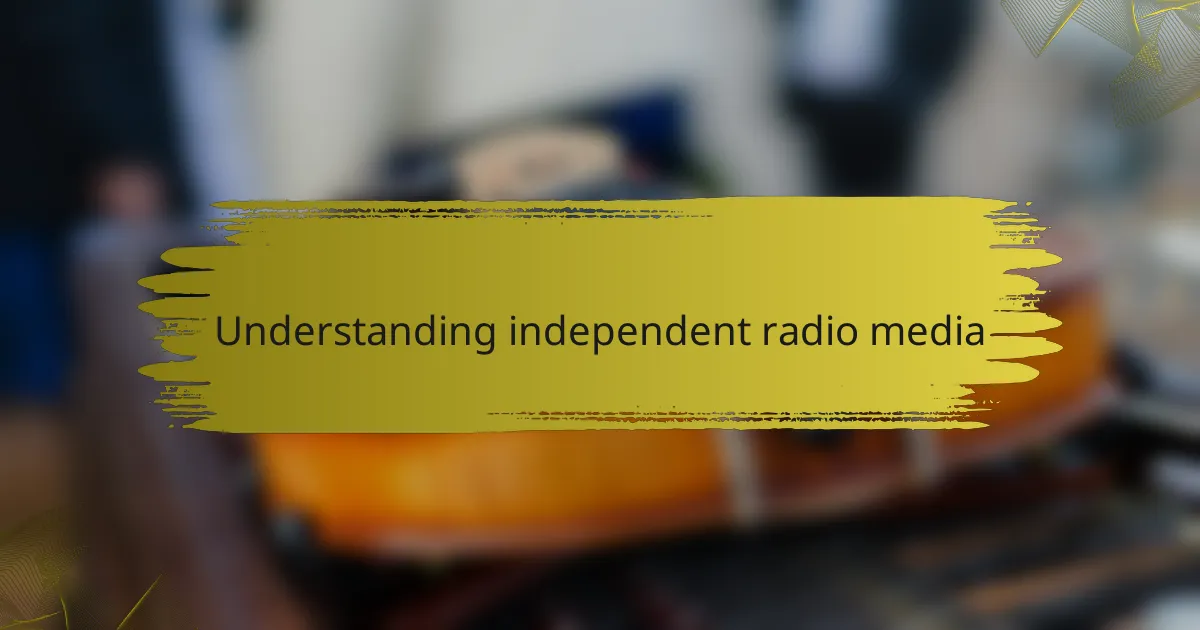
Understanding Independent Radio Media
Independent radio media serves as a vital platform for diverse voices, often providing an alternative to mainstream programming. I remember the first time I tuned into a local independent station; the unique stories and community-focused segments struck a chord with me. It prompted me to think: how often do we hear genuine narratives in corporate media?
What excites me most about independent radio is its grassroots nature. These stations often rely on community support and volunteers, creating a tight-knit atmosphere where everyone contributes their unique flair. I learned that true creativity flourishes in spaces like this. It’s a refreshing reminder that media can exist outside the confines of profit-driven motives.
Moreover, independent radio empowers underrepresented communities by amplifying their messages. I witnessed this firsthand during my volunteer experience, where we highlighted important local issues that often went overlooked in broader discussions. Isn’t it incredible how a small station can impact community awareness and engagement? I believe this is the heart of independent radio: fostering connection through authentic storytelling.
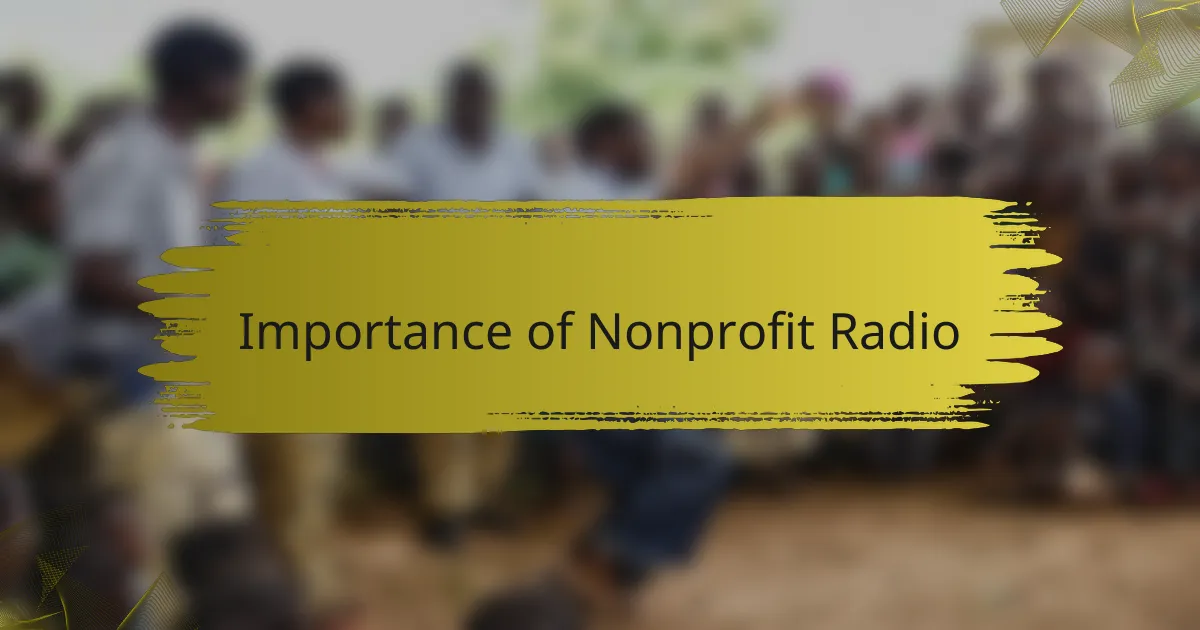
Importance of Nonprofit Radio
Nonprofit radio plays a crucial role in fostering community engagement and providing diverse voices that often go unheard in mainstream media. During my time volunteering at a Chicago nonprofit radio station, I quickly learned how local programming can reflect the community’s diverse culture and concerns. I remember producing a segment that highlighted a local immigrant artist; seeing her joy when her story was aired made it clear just how impactful our work could be.
The beauty of nonprofit radio lies in its commitment to serving the public interest rather than profit. Here are some key reasons why it is so important:
- Community Connection: Nonprofit radio creates a platform for local stories and voices that resonate with the community.
- Diverse Perspectives: It offers programming that reflects a variety of cultures, lifestyles, and opinions often overlooked by commercial stations.
- Educational Opportunities: Stations often provide training and volunteering opportunities for individuals to learn skills in broadcasting and media production.
- Advocacy for Change: Nonprofit stations serve as a voice for social issues, rallying communities to engage in important dialogues and activism.
- Cultural Preservation: They help preserve the heritage and history of local communities through music, storytelling, and discussions.
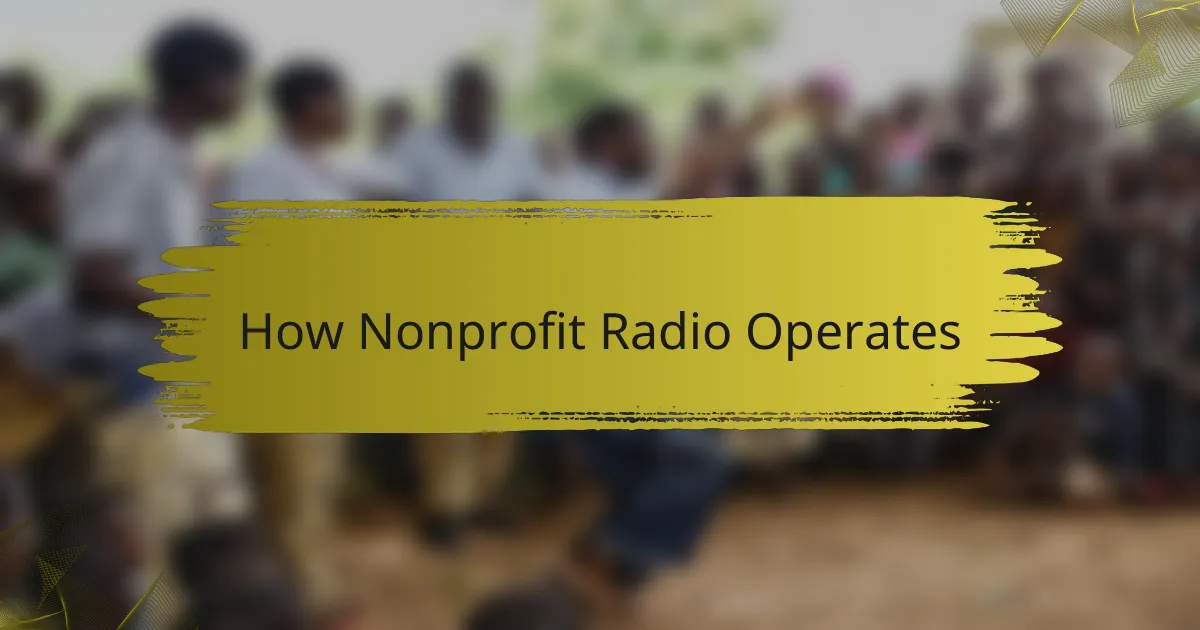
How Nonprofit Radio Operates
Nonprofit radio operates quite differently from commercial stations. They focus on community engagement and having a voice for diverse groups rather than maximizing advertising revenue. During my time volunteering in Chicago, I witnessed firsthand how passionate individuals unite around shared interests, creating a vibrant space for storytelling and music that reflects the local culture.
What struck me most was the commitment to local issues and events. I remember attending a weekly meeting where volunteers brainstormed programming ideas, ensuring that each show resonated with the community. It was inspiring to see how our collective efforts contributed to something bigger than ourselves.
One of the key differences between nonprofit radio and commercial stations lies in their funding and mission. Let’s look at these contrasts in a more structured way:
| Aspect | Nonprofit Radio | Commercial Radio |
|---|---|---|
| Funding | Grants, donations, membership fees | Advertising revenue |
| Programming Focus | Community engagement and local issues | Mainstream content for broad audience appeal |
| Mission | Serve the community and promote diversity | Maximize profits for shareholders |
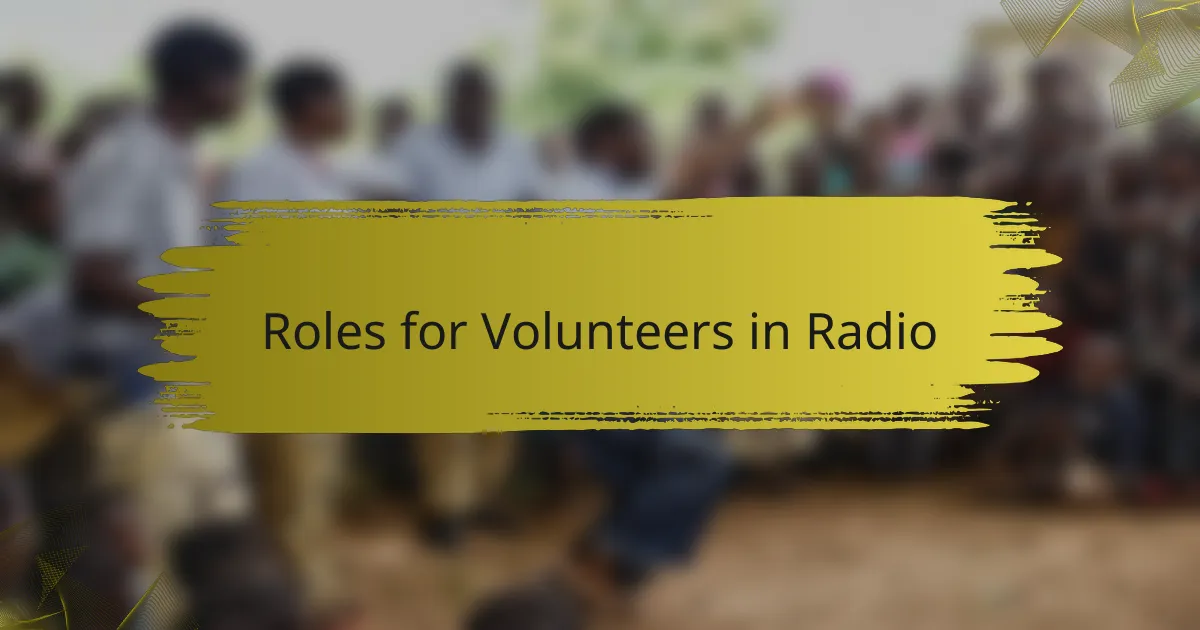
Roles for Volunteers in Radio
Volunteering at a nonprofit radio station can be one of the most rewarding experiences. One role I took on was assisting with on-air programming. I remember the thrill of selecting music and crafting playlists that not only reflected my taste but also resonated with our listeners. It was fulfilling to hear feedback from the community about how much they enjoyed the songs we played.
Moreover, volunteers can step into various roles, contributing in diverse and meaningful ways. Each task, whether in the studio or behind the scenes, has its own unique set of challenges and joys. I’ve seen how passionate volunteers leave their mark, helping to create a warm and inviting atmosphere for listeners and fellow team members alike.
- On-air host or DJ: Engaging with audiences and sharing music, stories, or interviews.
- Production assistant: Helping with the technical aspects, like editing audio and ensuring smooth broadcasts.
- Marketing and promotion: Spreading the word about the station through social media and community events.
- Fundraising support: Organizing events or campaigns to raise awareness and financial support for the station.
- Community outreach: Connecting with local organizations to foster partnerships and collaboration.
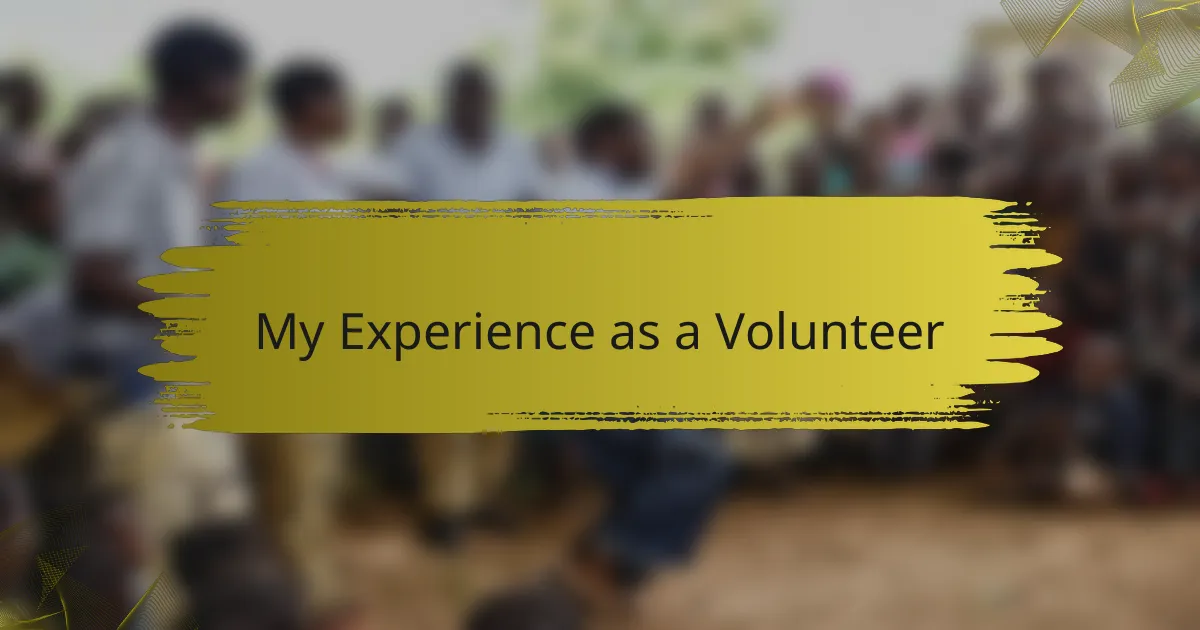
My Experience as a Volunteer
Volunteering at the nonprofit radio station in Chicago was a transformative experience for me. I remember stepping into the studio for the first time, feeling a blend of excitement and nervousness. The energy in the air was palpable, filled with the enthusiasm of people united by a common goal: to provide unique content and serve the community.
During my time there, I took on various roles that allowed me to explore different aspects of radio production. Here’s a brief look at what my experience encompassed:
- Show Preparation: Helping to research topics and prepare scripts for on-air discussions, which taught me the importance of thorough preparation.
- Audio Editing: Learning the ropes of editing software, I discovered a new appreciation for the art of sound and its impact on storytelling.
- Community Engagement: Attending local events to promote the station, which helped me connect with listeners and gather their stories, enriching our programming.
- Team Collaboration: Working alongside passionate volunteers and staff, I was amazed at the creativity and camaraderie that blossomed in such a supportive environment.
Each moment not only honed my skills but also deepened my commitment to community-driven media.
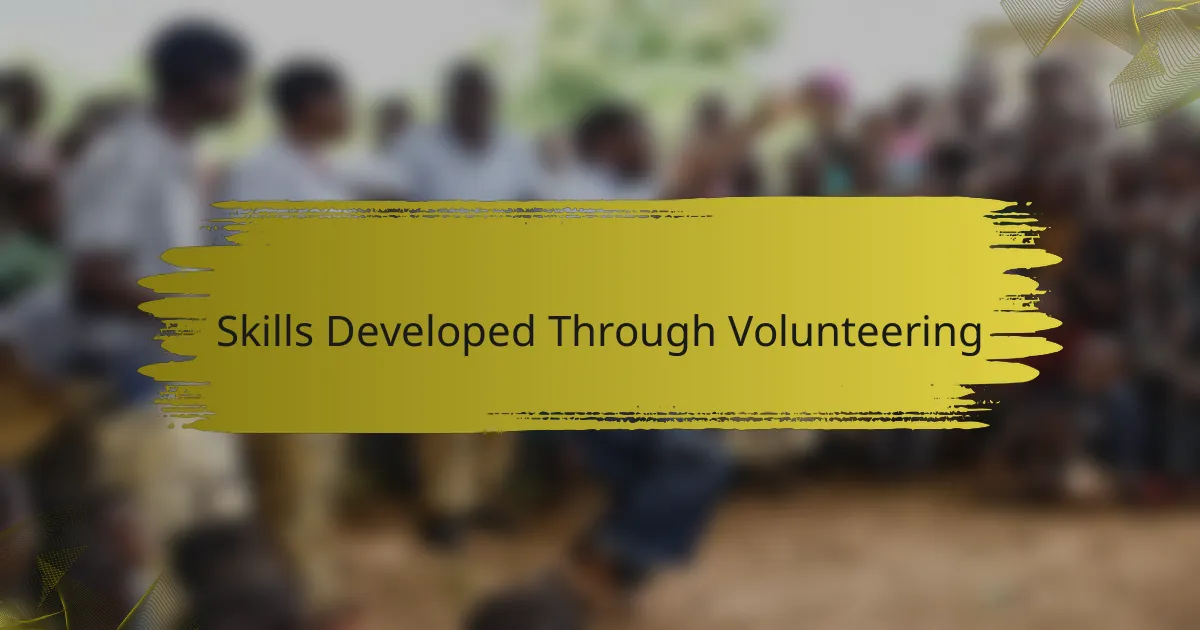
Skills Developed Through Volunteering
Volunteering at the radio station allowed me to develop a myriad of skills that I hadn’t anticipated. For instance, diving into audio editing taught me how to manipulate sound and enhance storytelling. I still remember the first time I put together a segment; the thrill of crafting a compelling narrative through sound was exhilarating. Have you ever experienced that rush of accomplishment when you see your hard work come to life?
I also honed my communication skills, especially during community outreach events. Engaging with listeners and promoting our programming helped me discover the power of conversation. I vividly remember chatting with a local artist at a festival; her enthusiasm reminded me how much people value having their voices heard. It reinforced my belief: effective communication can bridge gaps and foster connection.
Additionally, teamwork became a cornerstone of my volunteering experience. Collaborating with fellow volunteers made me appreciate the magic that happens when passionate individuals come together. I can still picture our weekly brainstorming sessions, where ideas flowed like a creative river. This collaborative spirit truly emphasized that fantastic projects stem from collective passion and effort. What’s better than being part of a community that shares your vision?
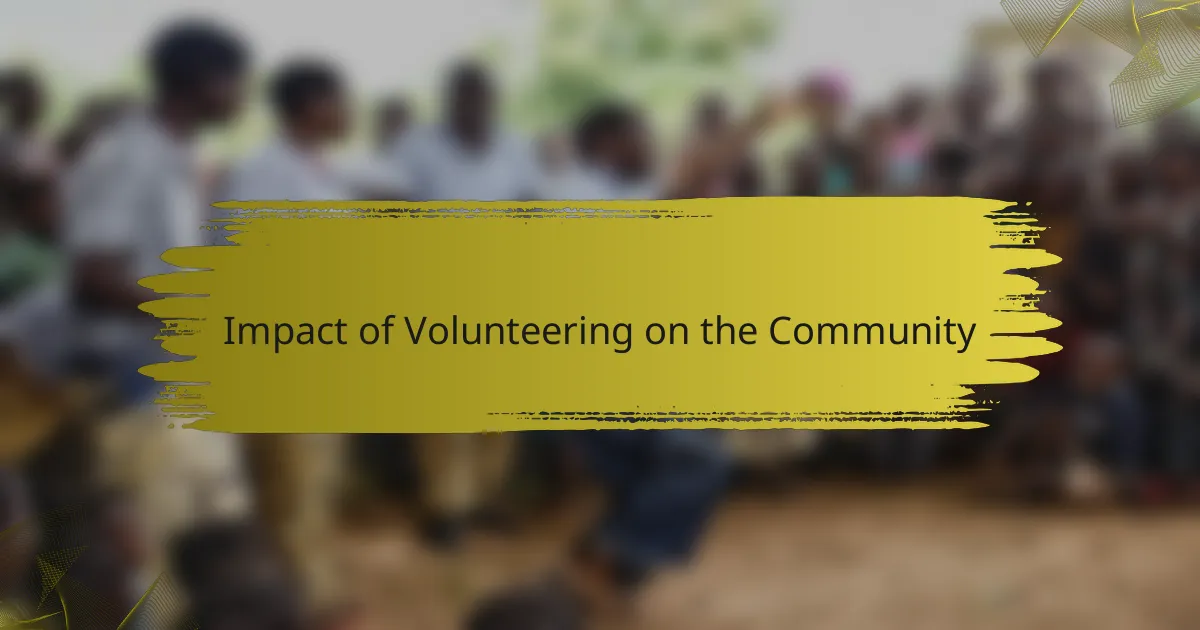
Impact of Volunteering on the Community
Volunteering at a nonprofit radio station in Chicago opened my eyes to the profound impact community media can have. I witnessed firsthand how dedicated voices can create a platform for local issues, promote cultural diversity, and foster connection among listeners. It’s amazing how a song, a story, or a conversation can resonate deeply and inspire a sense of belonging.
The benefits of volunteering extend beyond the station itself, actively enriching the community in various ways:
- Promoting Local Talent: By showcasing musicians, artists, and community leaders, we amplify voices that may otherwise go unheard.
- Information Dissemination: The radio acts as an educational tool, presenting important news and discussions relevant to the community.
- Social Cohesion: It brings people together, creating bonds through shared experiences and support.
- Skill Development: Volunteers gain valuable skills in media, communication, and teamwork, which can help them in future career paths.
- Cultural Preservation: By sharing diverse stories and music, we help preserve and promote the cultural heritage of the community.
These insights are not just statistics; they represent real connections and growth that I felt during my time as a volunteer, making every moment worthwhile.
